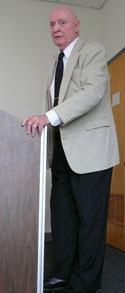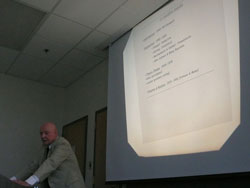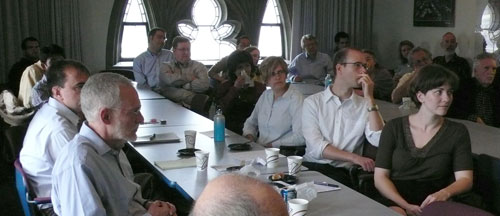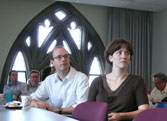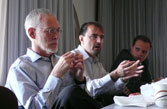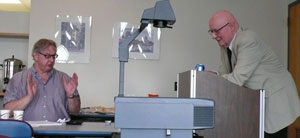::: center home >> being here >> last donut? >> rescher |
Progress
From 1945-55, there was the era of Hempel and confirmation. It was hoped then that the key to unlocking the deep problems of philosophy of science would come from insights in the theory of confirmation. Those hopes were eclipsed in the next decade, 1955-65, by the notion of explanation, for which the high hopes were then held. Here again we looked to the work of Hempel and now also Carnap, Reichenbach and Helmer; and Nick's former colleague Wes Salmon. Now probabilistic and Bayesian notions entered. Then in 1965-1975 came the era of scientific change; it was all Kuhn and Lakatos and more. Only after that did we get to the era of progress and realism, 1975-1985. This now finally set the stage for Nick's main argument. The history was parochial and not new and, for Nick, it was merely stage setting. Yet somehow I found it thrilling. That was a little puzzle to solve. What made it so? I pondered as Nick talked. First, there was the boldness of vision. All these issues were familiar. But they were entangled and interwoven in my thoughts. Here was a bold statement of THE problem of the era, for each decade. It was, of course, an oversimplification and Peter Machamer pointed out just that in question time later. Still I found it a welcome oversimplification. For it provided a framework within which to understand the evolution of our corner of philosophy of science. We could and should add adjustments and corrections. The result would still be a better organized conception, a sharper picture, than the inchoate mass I had before. There was more, however. I had overlapped for a few years with an aging Hempel here at the University of Pittsburgh; and I'd gotten to know and admire Wes Salmon. Otherwise, most of the names were just names; and the eras just history passed. Not so for Nick. This was personal experience for him. With his 1951 PhD, he had lived through all this; he had been a part of it; and he had contributed to it. That, I now saw, is what was gripping me: the immediacy of his experience of great eras. Nick was mentioning these eras with the same casualness that I might use when I list the neighborhoods passed on my morning bus ride to the University. These thoughts warmed me as Nick continued. He began to map out the different senses of progress and the different senses of the perfections to which progress may be thought to be moving. All these senses, he urged, were defective. One by one, he demolished them, with the mechanical certainty of a great siege engine, penetrating the rings of medieval walls. John D. Norton |


